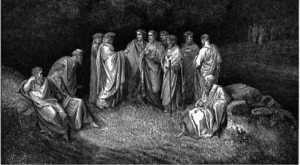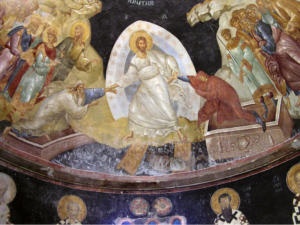Christos Anesti! Christ is Risen!
Alithos Anesti! Truly, He is Risen!
I have the distinctive pleasure of being paid to lead a class of students in reading the Great Books of the Western literary canon. I know, I know. It’s a dirty job, etc., etc. One text which I relish covering with the undergraduates is Dante’s Inferno and, while mediating upon what to share with you this Easter day, I was reminded of a particular scene from that work, the greatest of Christian poems.
Early in the Inferno, Dante the pilgrim and his guide, the Latin poet Virgil, arrive at the latter’s “permanent address,” Limbo. Limbo is described as the eternal residence of those
souls who, while on earth, did not sin but lacked baptism, “the door to the faith” (Inf. 4.36). While he is there, Dante spies the souls of many famous men and women from classical history and myth, such as Electra, Socrates, Plato, and Aristotle. The existence of these non-baptized noble souls is not one of judgment, let alone torture. They live amid a cool and verdant meadow, high and bathed in light, resembling the enclosure to an open courtyard. While to the eye this place is one of beauty, to the ear it is far less so. What one hears upon entering this lush and pleasant pasture are sighs “of sorrow without torments” (Inf. 4.28). Though the pilgrim finds himself amid a collection of the greatest poets from classical antiquity, i.e., Homer, Horace, Ovid, Lucan, and his own guide Virgil, there is no singing in Limbo, no music. The souls in Limbo have lost something for which the scenery cannot compensate: hope.
What Dante the poet is trying to bring to life for us is an entirely and completely natural world, a world of nature without grace. As St. Thomas reminds us, the perfection of our natural desires cannot be fulfilled by natural ends alone. The human person is directed to an end which is beyond his/her capacity to achieve without assistance. Since eternal life with God is the end to which we are called and for which we were made, it is God who must do the assisting. Without God’s help, the best that human nature, and the entire created world, can offer is still not enough to satisfy our deepest desires and longings. To quote another famous theologian saint: “Our hearts are restless till they rest in Thee” (August. Conf. 1.1). The scene which Dante has brought to life for us, therefore, is one which depicts the world without grace. At best, creation can be quite attractive and even beautiful. But without the gift of grace, the most stunning botanical courtyard can seem like a prison.
While in Limbo, Dante the pilgrim asks Virgil if any of the souls residing there have ever left it for eternal beatitude. Virgil (70-19 B.C.E.) states that he was newly arrived when he witnessed the coming of the LORD “with the sign of the victory crown” (Inf. 4.54). That to which Virgil is alluding is the Christian doctrine of the Harrowing of Hell. The Latin poet states that after Good Friday, Christ “made blessed” (Inf. 4.62) the souls of the OT patriarchs and matriarchs, prophets and kings. Unlike the Gentile non-baptized residents of Limbo, these souls were the recipients of God’s covenant and, while on earth, lived in the hope that God would fulfill his promises to Israel. Just as the permanent residents of Limbo lived without hope on earth and thus continue to do so in the afterlife, so too the transient residents of Limbo lived in hope on earth and continued to do so in the afterlife. The event which fulfilled their hope, and brought about the attainment of their deepest desires, was the redemptive death and resurrection of Christ. The resurrection of Christ inaugurates a new creation. Jesus’ resurrection is the “first-fruit” (1 Cor 15:20, 23), a sign of the things to come which have begun in him. In being joined to Christ, we too become new creations or, as St. Cyril of Jerusalem writes, after baptism “you are properly called Christs” (Catechetical Lectures 21.1). In being united to Christ, we become by adoption what he is by nature; i.e., sons and daughters of the Father.
In the Eastern Christian tradition, the artistic representation of the mystery Christ’s resurrection is not a glorified Christ standing next to an empty tomb. Rather, the Resurrection (Anastasis) Icon depicts the Harrowing of Hell. In this image, the glorified Christ is seen clutching the hands of Adam and Eve, who represent all of humanity. At Jesus’ feet are the “doors of Hell,” which he has burst open, and those objects scattered on the ground are shrapnel from the metalwork of the doors. One might interpret them as those tiny but infinitely-numbered little things we do every day which keep Jesus out of our lives. In addition, at Jesus’ feet also lays what looks like a corpse. This, of course, is death itself, which Christ has conquered and destroyed (cf. 1 Cor 15). The figures in the background on either side of Christ are the souls of those whom he has come to redeem. On the left, St. John the Baptist (the Forerunner) is closest to Jesus, and behind him are those OT kings who predicted the coming of the Savior: David (in the Psalms) and Solomon (in the Book of Wisdom). On right side are those patriarchs and prophets who lived in hope of God’s redemption, but predicted or prefigured Christ’s coming more obliquely: Abel, Moses, etc.
What these poetic and artistic representations, as well as the doctrine of the Harrowing of Hell itself, should help us to recall is both our need for God’s grace and God’s most abounding love in providing it to us. It was not cheap. The price was the life of His only-begotten Son. But for those united to Christ by the grace which he has won for us, everything is changed. By grace, our human nature has been raised from sin and death. By grace, we can affirm, with Fr. Hopkins, that “the world is charged with the grandeur of God.” By grace, we have become adopted sons and daughters of our heavenly Father. The Paschal Triduum is not just the re-presentation of Christ’s death and resurrection. It is also the story of our salvation. In short, Easter changes everything.
Anthony Coleman teaches theology for Saint Joseph’s College Online.



Mentor Coleman,
This piece is full of juicy bits of biblical truth and specific detail about what Easter really means to all humanity. Thank you for an eloquent, clearly written piece Mr. Coleman. The gist I received from this piece is focused on one word, which is hope. Christ has given a redemptive option to the lost souls (Limbo) and those who are truly repentant, even in hell. I think and feel Mr. Coleman, Christ would give Gabriel a second chance if he truly was sorry and corrected his God complex (Ego of wanting to become God). Although, Lucifer would have to meet Christ halfway (ipse christi) to start the redemptive process to where he should be, the Archangel Gabriel.
Grace
Beatus Pascha to you Mr. Coleman and the rest of Saint Josephs Faculty, the college and the world.
Dashaun Lipscomb – a student at Saint Josephs College online.
Anthony, this is an exquisite piece full of details, I had to read it several times to get the gist of this Catholic blog.
Hope offers anyone a chance for redemption via Christ, rather here on earth or in the spiritual ethos in the mystical body of the Father.
My hat is off to you Mr. Coleman. Fantastic! Fantastic! I feel and know I am going to purchase Dante’s Inferno, as a venture to further understand your piece. Dante’s book should be a good read.
V/R (very respectfully),
This has been a humbling and eyeopening experience.
Dashaun,
Thank you for your very kind words. If you are going to begin the Commedia, might I suggest Anthony Esolen’s translation (Modern Library Classics). Further, the Purgatorio is actually my favorite cantica. It resembles life “here on earth,” and what it ought to be for the Christian disciple, more closely than either the Inferno or the Paradiso.
Have a blessed Easter season!
Thank you kind sir and I have found the book at Amazon.com at this url: http://www.amazon.com/Inferno-Modern-Library-Classics-Dante/dp/034548357X
HA! If I keep going like this, I should be able to get a theological education from the blogs alone w/recommended readings/commentary.
What a great gift and I’m also learning Italian to be able to read 3 books the pope likes to read at the beach and his 8 others plus Dante and Faith of our Fathers, along with the Catholic Bible and Saint Peters Roman Missal. This way I will some way see what the Pope sees, and be able to work with him, and yet still be original with a few of my own.
I wish you and the staff a blessed Easter!!! I see Pope Francis as a 5 star General with wisdom/knowledge just no applications until Jesus Christ teaches it to us. I just hope to get into heaven and perhaps become a CMSGT of the Air Force/Special Forces ParaRescue. In other words, I know heaven is structured, but to my limited understanding this is how I see it. As you well no, the Pope is in mental, spiritual bootcamp for Christ 24 hours a day, it is his life. while we have school, family, kids, prepare meals, TV, the outside world- where Pope Francis is always around the Holy Spirit/Holy SEE as the vicar of Christ. He had to learn everything Biblical in German and speaks eight languages fluently. Incredible and he has been blessed by the Holy Spirit. I love Pope Francis and am a Franciscan also, I cannot wait for Sunday Mass with Father Norman King- he turned me on to Faith of our Fathers. Endure to the end Anthony, all the staff are already Generals as I see it. Beautiful! Keep Going and the Faith!!! Pray for peace in the Middle East, the world and me.
Warmest Regards,
Dashaun Lipscomb
The hymn we sing in the Byzantine churches during the Paschal season is, “Christ is risen from the dead and by his death he has trampled upon death and given life to those who are in the tombs. The icon in your post is a reflection of this hymn and of the great mystery of the feast.
Christ is Risen!